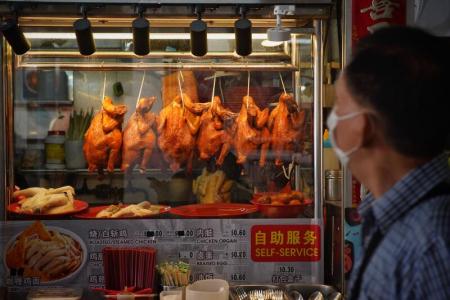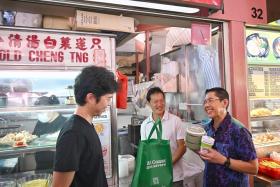Malaysia to resume chicken exports from Oct
Supply stability and high prices are on the minds of consumers and poultry-related businesses here even as they welcome the planned resumption of Malaysian chicken exports from October.
Some chicken rice stall owners here fear that the move does not mean a guaranteed supply.
Malaysia's announcement on Monday (Aug 29) of a further lifting of a ban on chicken exports in place since June 1 came with several caveats, including only allowing selected farms to resume exports.
Tan Sri Annuar Musa, chairman of Malaysia's anti-inflation task force, had also stressed that the Malaysian Cabinet said that priority must continue to be given to domestic consumption first, even when there is a small oversupply.
Mr Aloysius Teng, 27, who works at Xing Yun Hainanese Boneless Chicken Rice in Yuhua Market and Hawker Centre, noted Mr Annuar's caveat that Malaysia's exports should not affect the output of chicken meant for consumption domestically.
"This means that they can cut the chicken export anytime they want, which puts us chicken rice stall owners, in a difficult situation," he said.
"For example, I could be using fresh chicken for a week and then Malaysia decides to cut fresh chicken exports... then we have to resort to using kampung chicken again, which is rather expensive and that can affect our business cost."
He is also unsure if his supplier will be among the recipients of chickens from the approved list of exporters.
Others like Madam Amira, 44, a hawker who sells chicken rice on the second floor of Geylang Serai market, looks forward to having fresh chicken from Malaysia again.
"I really hope it doesn't take too long for the resumption to happen, so we can have a steady supply again," she said.
Besides the price increase by a dollar to $5, she said that customers have complained about the difference in the quality and taste of the food.
"Yes, countries like Indonesia have stepped in to help (by supplying frozen chicken), but the customers don't feel like it's the same," said Madam Amira, who is using Indonesian chicken for now.
The Singapore Food Agency (SFA) approved Indonesia as a new source of frozen, chilled and processed chicken meat on June 30, and the country started delivering frozen chicken from mid-July.
Malaysia imposed the ban on chicken exports on June 1 following a shortage of supply. Prior to the ban, it exported 3.6 million chickens a month, which made up about a third of Singapore's chicken. The export to Singapore of live kampung and black chickens, which are considered premium and more expensive, was allowed from mid-June.
The usual broiler chickens, which make up the biggest portion of Singapore's chicken imports from Malaysia, are typically exported to Singapore at around 40 days old.
The SFA said it has not received any official update from the Malaysian authorities on when exactly the chicken export ban might be lifted.
Some consumers The Straits Times spoke to said they have switched to other meats and seafood in the wake of the ban, and may do so permanently if chicken prices remain high.
It is also a matter of taste for Mr Rasheed Tirmizi, 42, a digital marketing executive.
"No amount of spices or seasoning could get rid of the aftertaste of frozen chicken, despite it being $3 to $5 more expensive than the chicken I used to get before the ban," he said.
Mr Rasheed said he has been buying frozen chicken from Brazil but the price, at $14 for a 1.2kg bird, is almost double that of fresh chicken before the Malaysian ban.
"This ban has reinforced the fact that nothing is permanent, and we need to have alternatives... if there isn't one, I'll strongly consider switching to red meat and seafood for me and my family," he said.
Design student Jade Soh, 24, does not expect prices to go back to normal after the ban has been lifted.
"It'll take some time for suppliers and supermarkets to get their hands on fresh chicken, keeping in mind the limited quantities, and for the prices to adjust again," she said.
"So I think Singaporeans shouldn't get too excited just yet, and stick with their frozen or kampung chicken."
While there is no confirmation on when exactly the chicken ban will lift, supermarkets here said they are monitoring the situation closely.
A spokesman for FairPrice said: “We are working closely with our suppliers and look forward to reinstating existing supply lines from Malaysia as soon as we are able to begin importing chicken from the country. More details will be shared when we have a more definitive timeline.
Similarly, a spokesman for DFI Retail Group, which owns Cold Storage and Giant, said: “We will be monitoring the situation closely while continuing to work with our diversified supplier base to ensure a steady supply of poultry products for our customers.”
Get The New Paper on your phone with the free TNP app. Download from the Apple App Store or Google Play Store now


